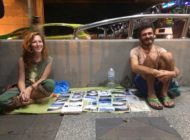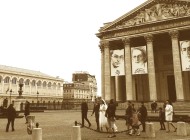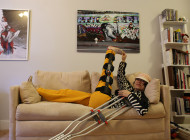“I can’t believe that all those years of Latin have come in handy!”
I smiled a smug inner smile to myself in the dark. The water weaved lines of pale blue light across the faux stone panel with “tepidarium” carved into it. “‘Caecilius est pater. Metella est Mater. Quintus est filius…’ and they’d all go off to the baths, leaving poor Cerberus the dog at home.” I continued musing, pleased with my crystal-clear recall of the Latin textbook from when I was twelve. We had followed this Roman family about their daily lives, our teacher reading out modern-day simplifications of Latin in a distinctly British accent as we fancied ourselves scholars of an ancient text. Oh the disappointment when it came time to study real Latin three years later! When Virgil’s flexible phraseology and lyrical prowess shattered our neat linear paradigm of subject+verb+object.
Over the years, the Latin faded. The grammar stayed in place—I still know my declensions and conjugations—but it’s like a hollow game of verbal geometrics without a living voice to articulate it.
That’s what happens when you learn a dead language poorly. The words and phrases are suspended in time, orphaned from their era, tripping off the tongues of modern-day people who can neither apprehend their vividness nor their conventionality. Latin, this language that we put up on a pedestal, along with those marble statues whose colours have long faded from their gaudy and dynamic original. Studied and esteemed by the intellect but never felt or absorbed by the person.
But today, in Soho, in the middle of bustling Manhattan, on a Saturday afternoon, I had finally found a place in my mind for this Latin. My teachers of course would have sighed a deep sigh of pained resignation. Did they teach me five years of Latin just for me to smile lazily ensconced in the commercial luxury of a spa styled after “the ancient baths“?
Did they explain to me the mind of Pliny the Younger and the monstrous metaphors of The Illiad just so that I could wriggle my toes in body-temperature water and hum along to Buddha-bar themed strains drifting benignly through the candle-lit half-gloom?
Yet that is how we make sense of things. In the moment, when something stops being abstract and becomes a part of daily reality. There I was, frantically trying to remember the different bathing pools and their temperatures when I saw the carved panels—”tepidarium,” “frigidarium,” “caldarium.” There, confusion solved. I could enjoy my 90 minutes of Roman-inspired reverie—a thoroughly restful but culturally dubious blend of Middle Eastern and Southeast Asian “influences” set around the context of ancient baths. It was exotic and somewhat politically incorrect, but sensorially splendid.
For that moment, I felt like an empress, a Roman one. And suddenly, my soul smiled on those years of learning Latin.
Tags: lifestyle multicultural nostalgia
























0 Comment